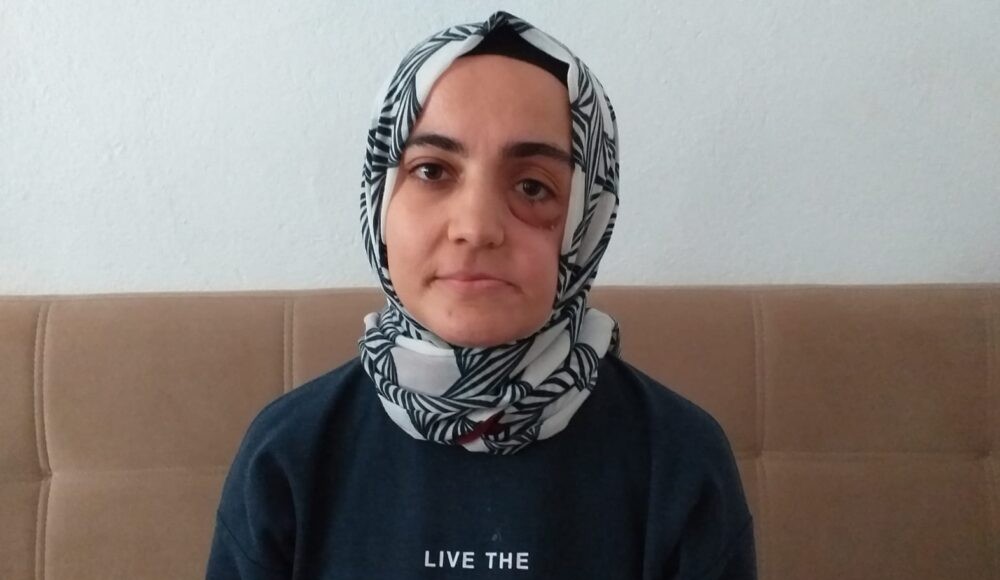Turkish authorities have refused to postpone the execution of the prison sentence of critically ill Ayşe Özdoğan, 34, who was arrested on Saturday and sent to prison on a terrorism conviction, the Stockholm Center for Freedom reported, citing Bold Medya.
According to Özdoğan’s sister Emine Erdem, 10 police officers came to take her sister away. Özdoğan’s arrest sparked outrage among human rights activists and opposition politicians.
Özdoğan, a former teacher, was handed down a nine year, four month prison sentence for alleged links to the Gülen movement. An appeals court on June 11 upheld her sentence despite severe health problems and a hospital report saying she was not fit to stay in prison.
Metin Günday, a professor of law and a former advisor to Justice Minister Abdülhamit Gül, criticized the arrest. “You have sent this woman to prison to die,” he said on Twitter. “I wonder if authorities believe they have served justice by imprisoning a woman with stage four cancer?”
4,evre kanser hastası olan Ayşe Özdoğan'ı, infaz erteleme talebi de reddedildikten sonra, cezaevine göndermekle adaleti ve hukukun üstünlüğünü sağlanmış mı oluyorsunuz?
Yazıklar olsun ! pic.twitter.com/etZcGw9Fwz— Metin Günday (@MetinGnday) October 2, 2021
Ömer Faruk Gergerlioğlu, a deputy from the Peoples’ Democratic Party (HDP), said Özdoğan’s arrest was unacceptable. “This woman is sick!” he said on Twitter. “The place she should be is not a prison cell.”
Mustafa Yeneroğlu, a deputy from the DEVA Party, pointed out that the Institute of Forensic Medicine had issued a report saying Özdoğan was not fit to be incarcerated. “The report clearly says Özdoğan cannot take care of herself and is not healthy enough to be in prison,” he said. “It is nothing less that torture to keep this woman in prison in the light of such a report.”
Yeneroğlu added that justice system was “paralyzed” in Turkey and that Özdoğan’s conviction was completely political.
Özdoğan called on authorities to postpone the execution of her sentence and was supported by Turkish Twitter users who conducted a hashtag campaign in June for her benefit.
Özdoğan and her husband were detained on April 8, 2019 for alleged links to the Gülen movement, but she was released due to her son’s heart condition. Her husband was sent to prison in southern Antalya province.
Özdoğan developed cancer seven months later and underwent an operation on November 12, 2019. However, she was arrested shortly thereafter, convicted and sentenced to nine years, six months in prison.
Özdoğan’s arrest sparked outrage, and thanks to an online campaign started by Gergerlioğlu, she was released pending appeal on December 27, 2019.
It was already too late for her second surgery, however, as the cancer had spread. Özdoğan’s teeth, palate, zygomatic bone and lymph nodes were removed in an emergency operation. Özdoğan lost her ability to see and hear after the operation due to the trauma her facial bones suffered.
In a previous tweet Özdoğan said she could no longer eat solid foods and suffered from a chronic infection in her sinuses, where a tumor was removed. She added that she could not chew or swallow because of the cancer.
Turkish President Recep Tayyip Erdoğan has been targeting followers of the Gülen movement since the corruption investigations of December 17-25, 2013, which implicated then-prime minister Erdoğan, his family members and his inner circle.
Dismissing the investigations as a Gülenist coup and conspiracy against his government, Erdoğan designated the movement as a terrorist organization and began to target its members. Erdoğan intensified the crackdown on the movement following a coup attempt on July 15, 2016 that he accused Gülen of masterminding. Gülen and the movement strongly deny involvement in the abortive putsch or any terrorist activity.
Critics have slammed Turkish authorities for refusing to release critically ill prisoners. Gergerlioğlu previously said critically ill political prisoners were not released from prison “until it reaches the point of no return.” He depicted the deaths of seriously ill prisoners in Turkey who are not released in time to receive proper medical treatment as acts of “murder” committed by the state.



